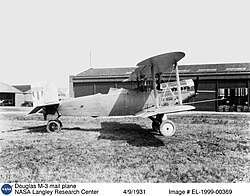Douglas M-1
| Douglas M-1 to M-4 | |
|---|---|
 The last surviving Douglas M-2 in the National Air and Space Museum |
|
| Type: | single-engine mail plane |
| Design country: | |
| Manufacturer: | |
| First flight: |
Spring 1925 |
| Commissioning: |
April 17, 1926 |
| Production time: |
1925 to 1926 |
| Number of pieces: |
57 |
The Douglas M-1, M-2, M-3 and M-4 series were single-engine biplanes developed for the US postal service and also the first civil aircraft from the Douglas Aircraft Company .
history

In the mid-1920s, the Douglas Aircraft Company began developing a mail plane for the United States Postal Service , which was intended as a replacement for the Airco DH4 , which had been in use until then , and which should have a significantly higher cargo capacity than it. The design, which initially received the factory designation Douglas DAM-1 ( D ouglas A ir M ail), was based on the two-seater reconnaissance aircraft Douglas O-2 . In order to create sufficient space for the mail, the control equipment and the cockpit instruments were relocated to the observer's position and the original pilot's seat was removed. The forward cockpit was lined with an aluminum tub that could be loaded from above through two cargo hatches. The relocation of the cockpit to the rear made it necessary to install two long exhaust pipes on both sides to protect the pilot from engine exhaust. The completed prototype was given the shortened designation Douglas M-1 (Douglas M ail) and made its maiden flight in the spring of 1925. The US Postal Service did not order the plane because it was planning to privatize mail air traffic .
At the beginning of 1926, the newly founded Western Air Express ordered six machines that had a front cooler instead of a tunnel cooler and whose cargo compartments were prepared at the factory for optional passenger transport. The cargo compartments can be quickly converted by inserting a seat if necessary. The aircraft were given the type designation Douglas M-2. The first two machines were put into service on April 17, 1926 on CAM Route 4 between Los Angeles and Salt Lake City . The first passenger transport took place on May 23, 1926.
Because the transcontinental route from New York to San Francisco should initially continue to be flown by the US Postal Service with its own aircraft, the state-owned company placed an order for 50 Douglas M-3 machines in March 1926 , which, in contrast to the M-2, was one Had wing paneling made of aluminum sheet and was not intended for an optional transport of passengers.
At the same time as the delivery of the first M-3, the development of the Douglas M-4 began, which was supposed to transport a larger payload. Due to the increased take-off weight, this type had wings extended by 1.47 meters , making its wingspan 13.56 meters. The US Postal Service was impressed by the performance of this version, so they only accepted ten Douglas M-3s and changed their outstanding orders in favor of the M-4. After the airline National Air Transport had taken over the air traffic on the transcontinental route between New York and Chicago on July 1, 1927 , the United States Postal Service sold all ten M-3 and eight M-4 to this company. By the end of 1927, the US Post sold the rest of the aircraft to other companies and to private individuals. The M-2, M-3 and M-4 series remained in service on the privatized postal routes until 1930.
Versions
- Douglas M-1
- single-seat mail plane with a Liberty L-12 engine and a wingspan of 12.09 meters, 1 prototype made
- Douglas M-2
- based on the M-1, with a modified cooler and a convertible cargo compartment to be able to carry two passengers if necessary, 6 machines built for Western Air Express.
- Douglas M-3
- based on the M-2, with wing paneling made of aluminum sheet instead of fabric covering, 10 aircraft built for the US Postal Service.
- Douglas M-4
- based on the M-3, with a wingspan extended by 1.47 meters and without a recess on the wing trailing edge, 39 machines built for the US Postal Service.
- Douglas M-4A
- identical to the M-4, Douglas used the changed type designation for a machine sold to Western Air Express .
Technical data of the Douglas M-4
| Parameter | Data |
|---|---|
| crew | 1 |
| Passengers | 2 (optional) |
| length | 8.81 m |
| span | 13.56 m |
| height | 3.07 m |
| Wing area | 38.18 m² |
| Empty mass | 1544 kg |
| Max. Takeoff mass | 2223 kg |
| Cruising speed | 177 km / h |
| Top speed | 225 km / h |
| Service ceiling | 5030 m |
| Range | 1127 km |
| Engines | a Liberty L-12 piston engine with 298 kW (around 400 hp) |